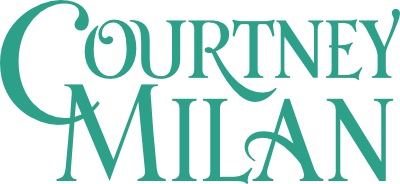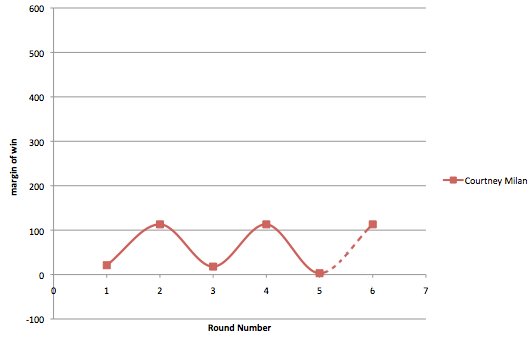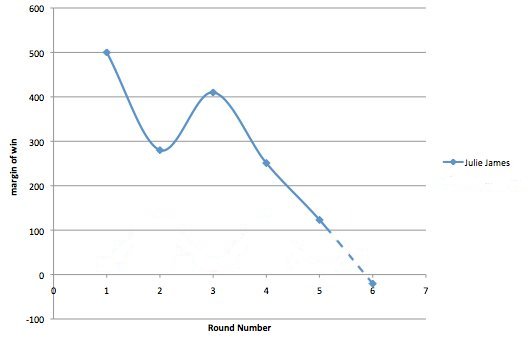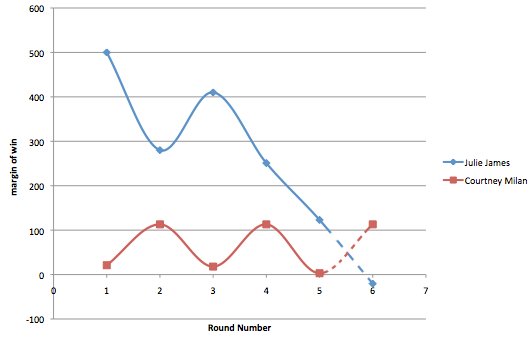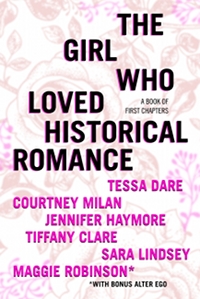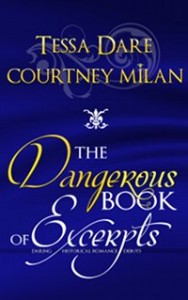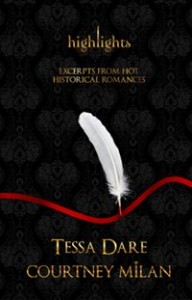On Twitter, I promised that if I somehow won Round 3 of DA BWAHA, against all odds, I would provide for you four first chapters of Trial by Desire. And somehow, I won…so I’m paying up. If you appreciate this at all, you should head over to http://dabwaha.com and vote for Julie James’s Something About You. I would never have won without her tireless campaigning.
It seemed appropriate, both because it’s Trial by Desire that’s up in DA BWAHA, and because at this year’s RWA National Workshop, I’m giving a workshop called “The Seven Deadly Sins of Second Books”–an account of all the ways that sophomore books can go bad, and how to (try to) prevent them.
Trial by Desire was a hard book to write. It was a really hard book to write, and required a huge amount of effort, as I’m sure you’ll see. These aren’t just four different first chapters here–these are four different conceptions of the book.
So, the first idea I had for the book went something along these lines: Ned goes to China at Kate’s behest, comes back, and Kate shoots him–on accident–mostly. Ned deals with his depression, and Kate deals with the fact that she is looking for a particular person, who, incidentally, she is planning to kill. Yes. Literally. Please don’t ask why–I don’t want to tell because I might save that bit of backstory for another book sometime.
I searched and searched for the version of this beginning, but honestly, it all appears to have disappeared in one of my subsequent laptop crashes, and hallelujah. It never worked. It never even came close to working. I never even got a full proposal, even though I tried about 900 different ways of writing the book. Finally, I realized that the version of the book in which Kate believed she would be hanged at any point because she was planning to kill someone, and Ned was dealing with his depression, was far too grim for me to write, and I scrapped the lot. Thankfully.
I can’t find this version, but what I can offer you instead is a scene from Proof by Seduction (spoilers for Proof ahoy!)–the original scene where Kate and Ned agree to marry.
Edited to add: Here is that scene. IT IS SPOILERY if you haven’t read Proof.
I still actually like this original better than the final one–because it’s just a little sweeter. I have always been sad about losing this one, but ultimately, after trying version after version after version along these lines, it just wouldn’t work to have Kate not be into the marriage, at least a little bit. Thus, version zero fell by the way side.
Version One started with neither Ned nor Kate leaving the country. I did write a substantial part of this version, but… it sucked so badly, for so many reasons. In any event, the book originally started with their wedding. This chapter isn’t utterly horrible. It took at least two chapters to start to fall entirely to pieces.
Thus was born Version Two, with new, stronger conflict. In this version, Ned left the country again–flat out abandoned Kate–and Kate, in his absence, wrote letters from him in order to maximize her father’s political gains. In case you were wondering, in all versions–from version zero, one, and two–Kate was not, in fact, her father’s daughter. In some of the versions, she knew that. In others, she did not, and discovered it as the book went along.
I wrote Version Two all the way to the end–90,000 words. Version Two of Trial by Desire is not a bad book, but it wasn’t a particularly good romance for a number of reasons. Here’s Chapter One of Version Two.
We come to Version Three. Version Three was after I scrapped Version Two almost in its entirety. Different plot. Different motivations. Different pieces. I rewrote the book–rewrote it, not revised it. In this version, Gareth and Jenny were more directly involved, as the woman who was being abused was not Louisa, a distant friend, but Laura, Gareth’s sister. Here’s the original prologue from Version Three.
Version Three had some major structural problems, many stemming from this inherent problem: How did Gareth and Jenny not notice that Laura was being abused? And why would Kate resist telling Gareth about his sister? There were no good answers, and after much futzing around and complication of motivations, I finally realized I was going to have to completely alter the relationships.
So I did, and from there, we get the more familiar Version Four, which we all know and love.
I have never had to do as much work for a book as I did for Trial by Desire. By contrast, Unveiled was a cake-walk.
And there you have it: four different versions for Trial by Desire.
I owe you something else, too–and hopefully, I will post it tomorrow.
